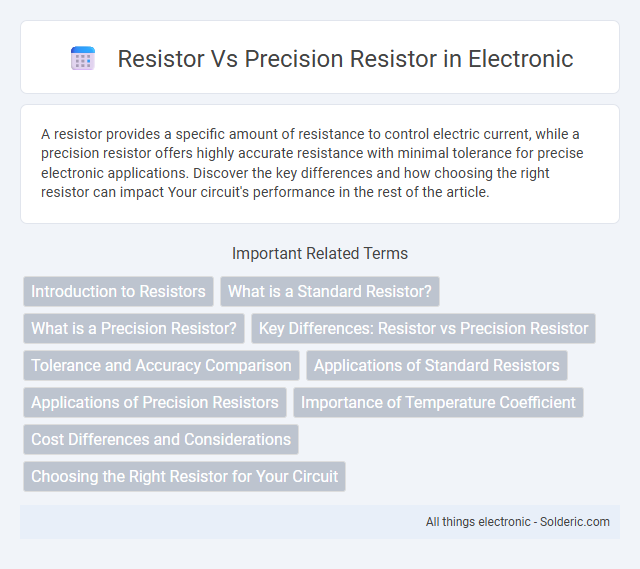A resistor provides a specific amount of resistance to control electric current, while a precision resistor offers highly accurate resistance with minimal tolerance for precise electronic applications. Discover the key differences and how choosing the right resistor can impact Your circuit's performance in the rest of the article.
Comparison Table
| Feature | Resistor | Precision Resistor |
|---|---|---|
| Tolerance | Typically +-5% to +-10% | High accuracy, typically +-0.1% to +-1% |
| Accuracy | Standard accuracy suitable for general use | High accuracy for critical applications |
| Temperature Coefficient | Higher, around 100 ppm/degC | Low, often below 50 ppm/degC |
| Stability | Moderate stability over time and temperature | Excellent long-term and thermal stability |
| Cost | Low cost | Higher cost due to precision manufacturing |
| Applications | General electronic circuits, non-critical tasks | Calibration, measurement, and high-precision circuits |
| Construction | Standard film or carbon composition | Metal film or wirewound with tighter controls |
Introduction to Resistors
Resistors regulate electrical current by providing a specific resistance value, crucial for controlling voltage and current in electronic circuits. Precision resistors offer exact resistance values with low tolerance, typically +-0.1% or better, ensuring consistent performance in sensitive applications such as instrumentation and measurement devices. Standard resistors commonly have tolerances around +-5%, making precision resistors essential for circuits requiring high accuracy and stability.
What is a Standard Resistor?
A standard resistor is an electronic component designed to provide a precise resistance value within a specified tolerance, typically ranging from +-1% to +-5%. It is commonly used in circuits where general resistance control is needed without requiring extremely high accuracy or stability. Unlike precision resistors, standard resistors may have higher temperature coefficients and are less suitable for applications demanding exact resistance and minimal drift.
What is a Precision Resistor?
A precision resistor is a resistor with a tightly controlled resistance value and tolerance, typically within +-0.1% or better, ensuring high accuracy in electronic circuits. Unlike standard resistors that may have wider tolerance ranges, precision resistors provide stable performance over temperature variations and long-term use, making them essential in measurement, testing, and calibration applications. Your designs benefit from precision resistors when exact resistance is critical for reliable and consistent circuit behavior.
Key Differences: Resistor vs Precision Resistor
Resistors regulate electrical current by providing resistance, measured in ohms, with standard values typically exhibiting +-5% tolerance. Precision resistors offer significantly tighter tolerances, often +-0.1% or better, ensuring minimal variation in resistance for applications requiring high accuracy. You should choose a precision resistor when your circuit demands exact resistance values for stable performance and reduced signal distortion.
Tolerance and Accuracy Comparison
Precision resistors offer significantly tighter tolerance levels, often within +-0.1% or better, compared to standard resistors that typically range from +-1% to +-5%. This enhanced tolerance ensures higher accuracy and stability in circuits requiring precise voltage and current control. The improved accuracy of precision resistors minimizes errors in sensitive electronic applications such as calibration equipment and measurement instruments.
Applications of Standard Resistors
Standard resistors are widely used in consumer electronics, power supplies, and general circuit design where moderate accuracy and stability are sufficient. They serve essential functions in voltage division, current limiting, and signal conditioning across various residential and industrial devices. Their cost-effectiveness and availability make them ideal for mass-production applications without stringent tolerance requirements.
Applications of Precision Resistors
Precision resistors are crucial in applications requiring exact resistance values and minimal tolerance, such as in medical devices, aerospace instrumentation, and high-accuracy measurement equipment. Their stability and low temperature coefficients ensure reliable performance in sensitive circuits, including voltage reference systems and audio equipment calibration. You benefit from consistent and accurate readings when selecting precision resistors for critical electronic designs.
Importance of Temperature Coefficient
The temperature coefficient is a critical factor differentiating a regular resistor from a precision resistor, as it measures the variation in resistance with temperature changes. Precision resistors have a significantly lower temperature coefficient, often measured in parts per million per degree Celsius (ppm/degC), ensuring minimal resistance drift and consistent performance in sensitive electronic circuits. Your choice of resistor should consider this parameter to maintain accuracy and stability in temperature-sensitive applications.
Cost Differences and Considerations
Resistors typically cost less due to their standard tolerance and mass production, making them suitable for general applications where exact resistance values aren't critical. Precision resistors, offering tighter tolerance levels often within 0.1% or better, command higher prices because of specialized manufacturing processes and enhanced stability features. When selecting components, your decision should weigh the importance of accuracy against budget constraints and product performance requirements.
Choosing the Right Resistor for Your Circuit
Choosing the right resistor for your circuit depends on the required tolerance, stability, and accuracy. Precision resistors offer low tolerance values (often +-0.1% or better) and enhanced temperature stability, making them ideal for sensitive applications where accurate voltage and current control are critical. Your selection should consider whether standard resistors meet the performance needs or if the enhanced reliability of precision resistors is necessary for optimal circuit functionality.
resistor vs precision resistor Infographic

 solderic.com
solderic.com